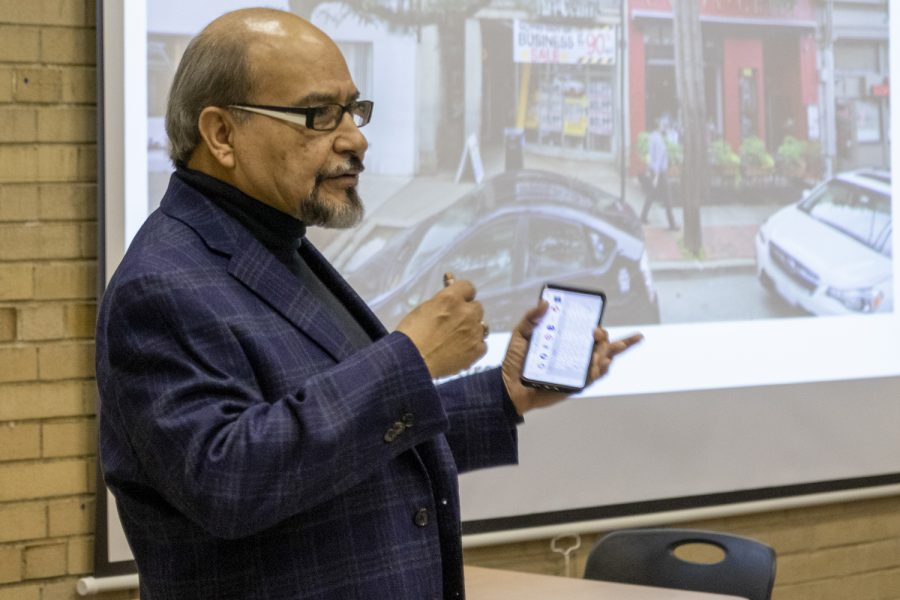Oakland Planning and Development meeting discusses new restaurant, parking lot
Juan Duque, senior project manager at ZILKA and Associates Inc., discusses the opening of a Pronto Mexican Fresh restaurant on South Craig Street.
January 29, 2020
The Oakland Planning and Development Corp.’s community meeting on Tuesday covered a wide array of subjects, including a giant pencil, Mexican food and an unpaved parking lot.
Jarrett Crowell, community planning and outreach coordinator for the Oakland Planning and Development Corp., began the meeting by asking the two dozen community members present to complete the Oakland Community Survey. The survey asks several questions — including what public transportation residents use, where they buy their groceries and how air quality affects their day-to-day life — that will help inform the Pittsburgh Department of City Planning’s plans for the development of Oakland.
He also announced that meetings to determine the specifics of the Oakland Neighborhood Plan will begin in April.
“[Meetings for the plan] kicked off in October, they’ve been meeting monthly and working on some visioning exercises to guide the planning process as the plan comes to form,” Crowell said.
One ongoing project presented at the meeting was the proposed renovation of the CMU Melwood parking lot. The parking lot sits across from Carnegie Mellon’s recent building acquisition on 477 Melwood Ave. — the former site of the Pittsburgh Filmmakers’ building.
The parking lot is currently split between the University of Pittsburgh and Carnegie Mellon University, with the rights to half of the lot going to CMU for their shuttles and vehicles and the other half being utilized by workers at the adjacent Pitt maintenance building. Carnegie Mellon is working with Pitt to pave the whole parking lot, not just the side used by Carnegie Mellon vehicles, according to Bob Reppe, Carnegie Mellon University’s senior director of planning and design.
Reppe said there is currently no paving, adequate storm management systems or street trees on the parking lot site. According to the timeline proposed at the meeting, most of the main renovations on the parking lot will take place in June and July of 2020, with flowering trees being planted on the hillside in fall.
“Our target right now is paving in two days during June, it’s the sub-surface work to put in below-ground storage tanks and tying them into the sewage lines and building the bio-swells at the top of the hill that will take most of June and July … it should be ready for parking by the time the students come back in the fall,” Reppe said.
The meeting also covered the proposed rezoning and facade construction of the former Top-Notch Art Supply storefront on 411 S. Craig St. The former art supply store will now become a new casual sit-down restaurant called Pronto Mexican Fresh — an offshoot of the Pittsburgh Mexican restaurant chain Patron Mexican Grill.
Juan Duque, senior project manager at ZILKA and Associates Inc., represented the owners of Pronto Mexican Fresh at the meeting. According to Duque, the restaurant will include seating for 71 patrons as well as an open concept kitchen, storage area and handicap accessible bathrooms.
In order for the space to function as a restaurant, it needs to be rezoned from a retail space to an assembly space. Duque defended this proposed rezoning by referring to a list of restaurants that currently surround the property.
One of the biggest exterior changes to the building involves the removal of the two-story high giant pencil that currently cuts through the building’s front wall. The pencil will be disassembled and then given to the Pittsburgh Historical Society for preservation.
Duque said the removal of the pencil from the original architecture won’t compromise the structural integrity of the building.
“The curtain wall is anchored to the wall of the existing structure behind it with an enclosed steel beam … that wall is pretty structurally secure, we’re just going to focus on extending the seating area,” Duque said.
Although the City of Pittsburgh’s municipal code requires a tree to be planted in front of every new building, Pronto Mexican Fresh is working with the Pittsburgh Shade Tree Commision to bypass this law. According to Duque, it would be difficult to plant a tree in front of the restaurant as there is already a parking meter and lamppost occupying sidewalk space.
“There isn’t any room to plant a tree, and even if we tried, we would have to be very, very careful because of the power cables running underneath the sidewalk,” Duque said.



